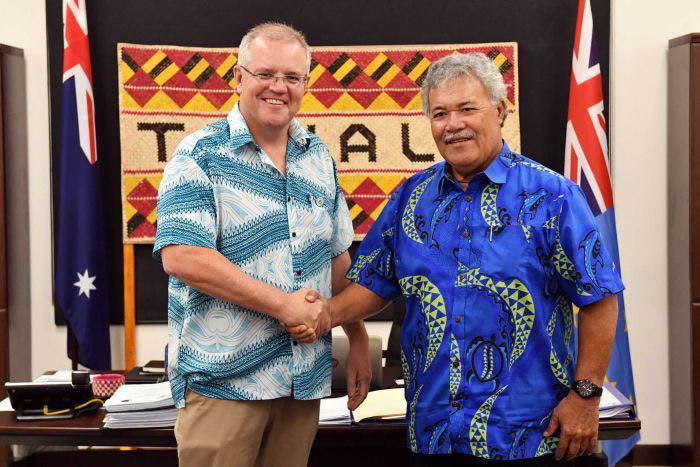Scott Morrison has left Pacific leaders seething over his government’s climate policy failings.

Even the most rusted-on opponents of climate change action must know in their hearts that Scott Morrison’s foray into the Pacific last week was a diplomatic train wreck. Except there are no trains in the Pacific, so maybe a shipwreck.
The trouble started when the PM refused to budge from his “red line” to retain fossil fuel subsidies, support new coal mines, stick with outdated carbon credits and a minimal Paris target, and to spurn the UN’s Green Climate Fund.
Radio talkback host Alan Jones weighed into the controversy by wondering aloud if the PM “will be fully briefed to shove a sock down her throat”, “her” being New Zealand leader Jacinda Ardern acting as an intermediary between Australia and other forum nations.
That was before deputy PM Michael McCormack put in his two bob’s worth by telling business people in his home town of Wagga that the islanders would survive climate change because they could always “pick our fruit grown with hard Australian enterprise and endeavour.”
Just before Morrison arrived in Tuvalu, island nations reaffirmed their earlier Fiji agreement that all nations should acknowledge the science, stop mining coal, strengthen Paris targets, reduce actual emissions instead of claiming Kyoto credits, and support multilateral aid to vulnerable countries.
With their nations’ viability under threat from warming and more acidic oceans, rising sea levels and increasingly intense storms, Pacific leaders were primed for a fight.
Jones and others have taken exception to this. They claim to understand the islands’ future better than islanders themselves. They say that fears about inundation are baseless and that coral’s natural capacity to grow will keep islands above the waves indefinitely.
People who are neither scientists nor local residents contradicting island people about the state of their own lands, where they live, is brazen disrespect. But the science, supported by plenty of recorded evidence of damage already done, shows those people are also simply wrong.
The islands most vulnerable to rising seas are coral atolls, formed over the top of a seamount, commonly an extinct volcano. These beautiful geological structures are prone to erosion and slow sinking, which the coral makes up for by perpetually growing.
That growing capacity is lost when land surfaces have been paved over for airports, streets and the like, as in Fongafale, the island where the forum was held. But even natural areas are in trouble if sea level rise outpaces the growing rate of the massive corals that form the atolls’ base.
These corals grow at most a couple of centimetres a year, while also losing mass through wave erosion. Atolls, which take many thousands of years to form, need sea levels to remain the same or to change very slowly, as has been the case for over 10,000 years.
But no longer. The most conservative sea level estimate is a rise of half a metre to a metre by 2100 – always remembering that after 2100 the level will continue rising for many centuries if drastic measures to curb global emissions are not taking effect by about 2030.
It doesn’t take a genius to figure that even if coral survives marine warming and a more acid ocean, and even if growth keeps pace with sea level rise, continuing to live on Fongafale will require massive infrastructure adjustments, way beyond the islanders’ limited economic resources.
But it isn’t just atolls under threat. Most productive land on all Pacific islands, including mountainous island groups like Fiji and the Solomons, is in low-lying areas, vulnerable to marine inundation. Food production on every Pacific island is compromised by climate change.
Driven by the prospect of losing much of their homeland, each island leader knows all this better than other heads of government. Meeting and corresponding with scientific experts and UN secretary-general António Guterres, they’ve made it their business to understand climate science.
Years of such accumulated knowledge gave them a big advantage over Morrison and his Pacific affairs minister Alex Hawke, who along with others in the Coalition have shown no interest in the science of climate change.
They were bound to get a chilly reception in Tuvalu when they tried to argue that Australia’s economy relied on mining coal and not cutting emissions, or that $500 million in redirected aid would compensate for increasingly frequent inundation of low-lying islands.
They had the added disadvantage of being part of a much larger society where leaders and other influential or wealthy people are able to separate themselves from ordinary life. Pacific leaders live hand in glove with their peoples’ distress and anxiety.
The Tuvalu meeting has primed Pacific island nations to move out of Australia’s orbit and into the lap of China, all too willing to offer its own form of patronage. Recent history offers little cause for hope that the Coalition can do the back-pedalling needed to repair the damage.
